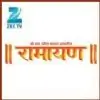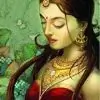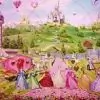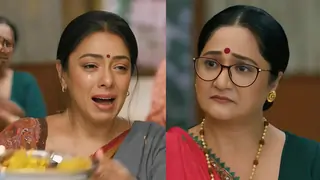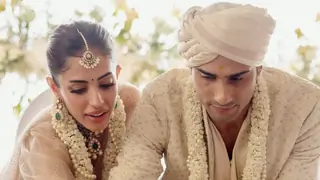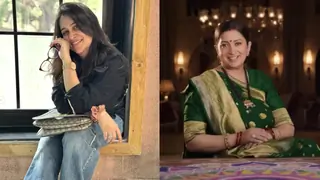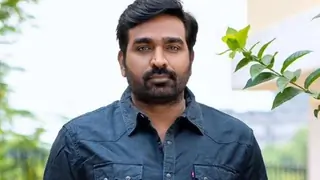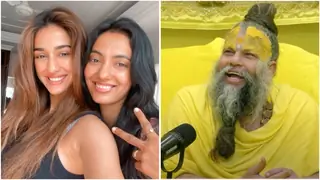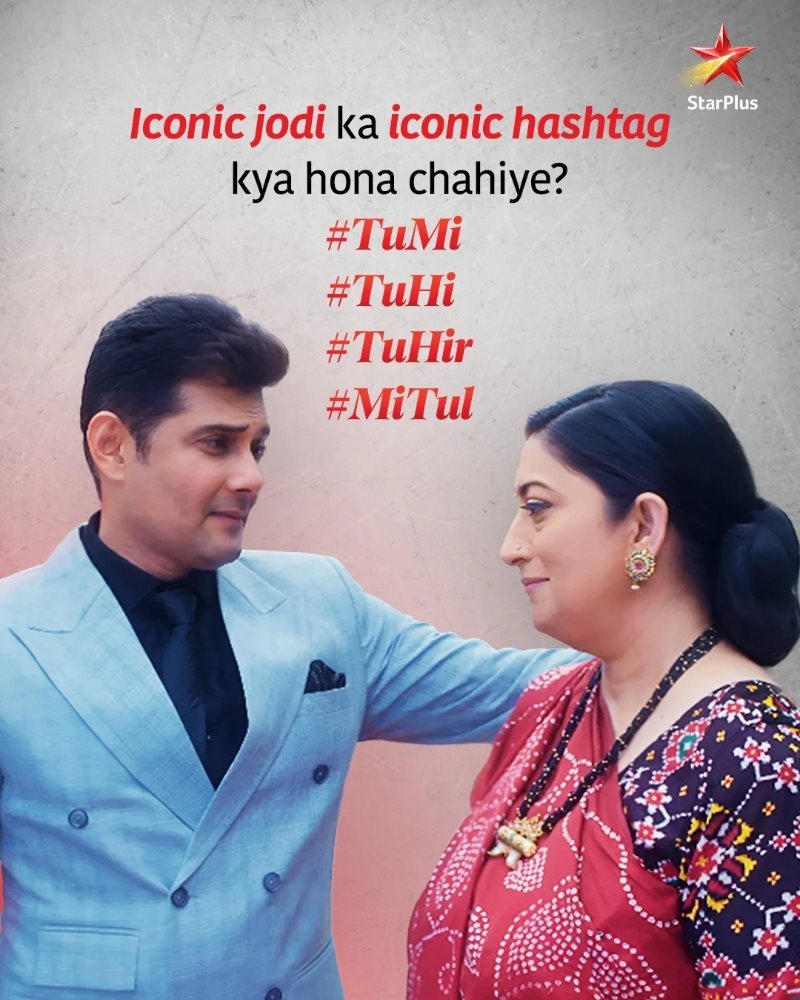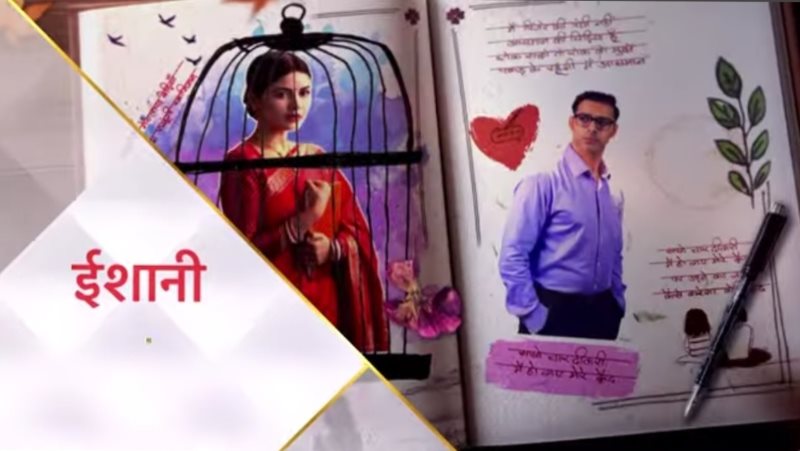WE ARE AWARE OF KING SEERADHWAJ JANAKA(21ST JANAKA OF VIDEHA KINGDOM) IN OUR RAMAYAN SERIAL...
''NOT ONLY AS THE FATHER OF SITA DEVI AND URMILA DEVI AND FATHER-IN-LAW OF SHRI RAM AND LAKSHMANJI''..HE WAS EXEMPLARY IN HIS OWN WAYS''A Saint who Chose a King as his Spiritual Guide
This relates to a GURU and his DISCIPLE, i.e ; of King Janaka and Shuka Deva(SON OF SAGE VYASA AND NARRATOR OF BHAGAVAT), a wonderful tale that exemplifies Aparigraha (non-attachment) or the art of living in the world, but not being of the world.
KING SEERADHWAJ JANAKA WITH QUEEN SUNAINA DEVI

In India it is customary for a devotee to seek out spiritual teachers until he finds the one whom he recognizes as his own God-chosen master or guru.
The novice, through inner fitful urgings, receives lessons from various sources; but when his spiritual ardor becomes very great, God sends him a guru. God uses the divine soul-vehicle of the guru as His messenger or instrument to bring the novice back to his spiritual home in Omnipresence.
When Shuka Deva decided to go in search of his guru, his father advised him to go to King Janaka, the ruler of the province.
As Shuka Deva entered the royal palace he saw the king sitting on an emerald- and diamond-studded golden throne surrounded by courtiers and by scantily clad women who were fanning him with big palm leaves (as is the custom in India during the hot season). King Janaka was smoking a big oriental pipe. This sight shocked Shuka Deva; he turned back and started walking briskly out of the palace.
Shuka deva muttered: "Shame on my father for sending me to that matter-soaked king! How could such a worldly man be my teacher?"
But King Janaka was both a king and a saint. He was in the world, but not of the world. (VIDEHA=HAVING NO CONCIOUSNESS OF HUMAN BODY OR Videha is knowing that: 'I am not the body; I have a body; this is my body, yet I am not the body.' You can walk feeling as though you have no body and the mind is in such a state of equanimity).
Highly advanced spiritually, he could telepathically sense the thoughts of the fleeing Shuka Deva. The saint-king sent a messenger after the boy, commanding him to come back. Thus the master and the devotee met.
King Janaka put Shuka Deva through a process of discipline to teach him the art of living in the world without acquiring misery-making attachment to it.
One day the king gave his new disciple two cup-shaped lamps, filled to the brim with oil.
Janaka said: "Hold a lamp on the palm of each hand, and enter all the gorgeously furnished rooms of the palace. Come back to me after you have seen everything; but remember, I will refuse to train you further if you spill a single drop of oil on the carpets. "
King Janaka instructed two messengers to accompany Shuka Deva and to refill the two lamps with oil as quickly as they burned down. It was a hard test; but, after two hours, Shuka Deva returned triumphantly without having dropped any oil from the lamps in his hands.
The king said: "Young Shuka Deva, tell me in detail what you saw in chamber of my palace."
To this Shuka Deva replied: "Royal Preceptor, my only accomplishment was that I did not spill any oil on your carpets. My mind was so concentrated on the thought of not dripping oil that I did not notice anything in the rooms."
King Janaka then declared: "I am disappointed! You have not completely passed my test. My injunctions were that you should see everything in all the chambers of my palace and that you should not drip any oil from the lamps. Go back with the lamps, and remember, no spilling of the oil while you are looking carefully at everything about the palace."
After ten hours, Shuka Deva calmly returned. He had not allowed any oil to drip, nor was he sweating with excitement as before. He could answer all the king's questions about the contents, however minute, of all the palace chambers.
King Janaka was pleased.He said gently, "My son attachment to possessions, and not possession itself, is the source of misery. In this world we do not own anything; we are only given the use of things. Some have more to use than others; but remember, the millionaire and the poor man alike have to leave everything, all possessions, when death comes. One should not live a one-sided life thinking only of God and neglecting one's duties in the world- -like your concentrating on the oil lamps and not seeing my palace. But on the second trip you kept your attention principally on the lamps without spilling oil, and at the same time thoroughly and minutely saw everything in the palace. So should you keep your attention on God, not letting a drop of your desire slip away from the lamp of God-revealing wisdom; and yet devote part of your attention to thoroughly performing the God-given duties of maintaining yourself and others given into your charge."
NOTE :
The Mahabharata also recounts how Suka was sent by Vyasa for training to King Janaka, who was considered to be a Jivanmukta, or one who is liberated while still in a body. Suka asked Janaka about the way to liberation, with Janaka recommending the traditional progression of the four ashramas, which included the householder stage. After expressing contempt for the householder life, Suka questioned Janaka about the real need for following the householder path. Seeing Suka's advanced state of realization, Janaka told him that there was no need in his case.
In the Bhagavad Gita Sri Krishna,cites Seeradhwaj Janaka as an illustrious example of the Karma Yoga.
Here smoking pipe doesn't refer to smoking TOBACCO.It is a NON-TOBACCO SMOKING PIPE as History of Tobacco usage dates from a much later period.
Women fanning the King were scantily clad means not something immodest in their dressing ! It was mentioned above that the season was hot ! Hence they dressed according to the climate unlike they cover themselves completely in cold conditions!(Videha Kingdom has the Himalayas near its Northern end (Present Indo-Nepal Border).Moreover, King Janaka had no vision of such things...He was a VIDEHA!






